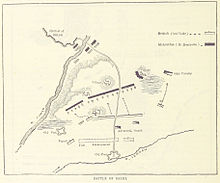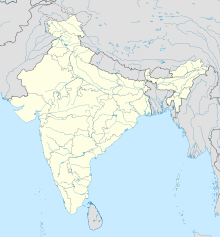| Battle of Delhi | |||||||
|---|---|---|---|---|---|---|---|
| Part of the Second Anglo-Maratha War | |||||||
 Map of the Battle of Delhi (1803) | |||||||
| |||||||
| Belligerents | |||||||
|
|
| ||||||
| Commanders and leaders | |||||||
| Gerard Lake |
Daulat Rao Scindia Louis Bourquin | ||||||
| Strength | |||||||
| 4,500 | 17,000 | ||||||
| Casualties and losses | |||||||
| Estimated 464–485 men killed or wounded | Estimated 3,000 killed or wounded | ||||||
  | |||||||
| Second Anglo-Maratha War | |
|---|---|
The Battle of Delhi or Battle of Patparganj took place on 11 September 1803 during the Second Anglo-Maratha War, between British East India Company troops of the Bombay Army under General Lake, and the Marathas of Scindia's army under General Louis Bourquin and Sardar Ravsaheb Wable.
Events
Bourquin had treacherously deserted his former friend General Perron and now commanded 1743 battalions of the latter's troops. The battle was fought at Mosadabad, right across the Yamuna River from Humayun's Tomb, also giving the battle its local name.
The Marathas initially occupied a strong position with the Yamuna River in their rear. But, General Gerard Lake, feigning a retreat, drew them from their lines and then turning upon them drove them with the bayonet into the river, inflicting more losses upon them. Finally, the city of Delhi fell three days later. As a result, the control of the city of Delhi passed from the Marathas to the British.
A monument was later erected at the site in Patparganj, marked out by a surrounding ditch, commemorating Cornet Sanguine and the Company army soldiers who fell during the battle.
References
- ^ Naravane, M.S. (2014). Battles of the Honorourable East India Company. A.P.H. Publishing Corporation. pp. 76–77. ISBN 9788131300343.